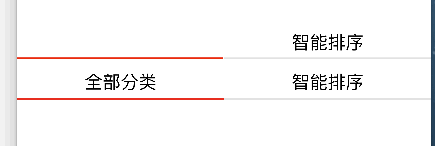SegmentControl 那些令人烦恼的事儿
每个人的曾经都很苦逼。我知道我很卑微,但我不曾放慢脚步,在这条路上至死不悔。愿与你同行。
UISegmentControl
-
概述
- UISegmentControl 是系统的段选择控件,具有简洁大方的外观,但是通常不能满足产品设计的需求。用户( developer )对 UISegmentControl 的外观的可控性是比较差的,为了满足我们
完美的产品设计需求,我们通常需要绞尽脑汁的思考如何去改变 UISegmentControl 的外观,但结果却不那么令人满意。最终你会发现 UISegmentControl 满足需求需要花费很多的时间(或者说初学者根本无法完成需求)。在此,首先简单叙述 UISegmentControl 的实现原理,和事件处理;然后,详细介绍如何自定义 IDSegmentControl,并与 UISegmentControl 对比。 大家在能使用系统控件的情况下,尽量使用系统控件。本 Blog 自定义 IDSegmentControl 只是向大家提供一种解决问题的方式。
- UISegmentControl 是系统的段选择控件,具有简洁大方的外观,但是通常不能满足产品设计的需求。用户( developer )对 UISegmentControl 的外观的可控性是比较差的,为了满足我们
-
效果图
![]()
注: 上边的是 UISegmentControl 实现的效果,下边是 IDSegmentControl 实现的效果 -
UISegmentControl(下面以 UISegmentControl 的示例,来叙述其使用细节)
-
初始化 UISegmentControl 实例,并设置标题(默认状态下,UISegmentControl不选中任何一个 segment)
self.segmentControl = [[UISegmentedControl alloc] initWithItems:@[@"全部分类", @"智能排序"]];-
效果
![]()
-
-
设置标题的字体和颜色(选中第一个 segment,此时的背景色为蓝色)
NSMutableDictionary *dictionary = [NSMutableDictionary dictionary]; dictionary[NSForegroundColorAttributeName] = [UIColor blackColor]; dictionary[NSFontAttributeName] = [UIFont systemFontOfSize:18]; [self.segmentControl setTitleTextAttributes:dictionary forState:UIControlStateNormal];-
效果
![]()
-
-
设置 segment 三个状态(不要问那三个状态哦)下的图片
[self.segmentControl setBackgroundImage:[UIImage imageNamed:@"unselected"] forState:UIControlStateNormal barMetrics:UIBarMetricsDefault]; [self.segmentControl setBackgroundImage:[UIImage imageNamed:@"selected"] forState:UIControlStateSelected barMetrics:UIBarMetricsDefault];
[self.segmentControl setBackgroundImage:[UIImage imageNamed:@"unselected"] forState:UIControlStateHighlighted barMetrics:UIBarMetricsDefault];
```- 效果  注:此时我们会看到,当选中 segment 时,文字会被遮挡(你可以让美工给你切个图哦,如果美工说:“你长的太丑了,不给切”。那你可以联系我,我会告诉你怎么做。`代码能解决的问题,就不用去找美工喽`)。-
改变分割线
-
使用 tintColor
[self.segmentControl setTintColor:[UIColor whiteColor]];-
效果
![]()
-
-
使用 dividerImage(设置一张图片即可)
- (void)setDividerImage:(nullable UIImage *)dividerImage forLeftSegmentState:(UIControlState)leftState rightSegmentState:(UIControlState)rightState barMetrics:(UIBarMetrics)barMetrics
-
-
默认选中第一个 segment
self.segmentControl.selectedSegmentIndex = 0;-
效果
![]()
-
-
为 UISegmentControl 添加事件
[self.segmentControl addTarget:self action:@selector(segmentControlselectedSegmentIndexChange:) forControlEvents:UIControlEventValueChanged]; -
至此,UISegmentControl 的使用已经简单介绍到此。接下来,会介绍如何实现自己的 segmentControl,如:IDSegmentControl。若你觉得没有必要,那就可以不要往下看了,你不会损失很多。但还是建议你看一下,因为我相信你会收获很多。
-
IDSegmentControl
-
概述
- 之所以自定义 IDSegmentControl,是为了增加其可控性,使其用起来更得心应手。同时也是一种技术的积淀。
-
设计思路
-
使用 UIView 的子类来实现 IDSegmentControl,每个 Item 是一个 Button,通过控制 Button 来控制 segment 的外观和事件
-
使用代理模式来实现 IDSegmentControl 的事件处理(
继承自 UIControl 的版本,会使用 addTarget 实现)注:
或许你的自定控件,通常是继承自 UIView,但是你是否想过让它继承自 UIControl 呢!!!若你有兴趣,那么请联系我,感谢您的支持
-
-
具体实现
-
设计接口
-
设置 IDSegmentControl 的 items 的 title(
IDSegmentControl 中 item 和 indicator 的布局需要基于 items 的 count)/** 所有segment的标题 */ @property (nonatomic, strong) NSArray *titlesOfSegments; #pragma mark - overided setter, update the appreance of the segmentControl - (void)setTitlesOfSegments:(NSArray *)titlesOfSegments { _titlesOfSegments = titlesOfSegments; // 根据 _titlesOfSegments 向 IDSegmentControl 中添加 items(button) for (NSInteger i = 0; i < _titlesOfSegments.count; i++) { UIButton *segmentButton = [[UIButton alloc] init]; [segmentButton.titleLabel setFont:[UIFont systemFontOfSize:18]]; [segmentButton setTitleColor:[UIColor blackColor] forState:UIControlStateNormal]; [segmentButton setTitle:_titlesOfSegments[i] forState:UIControlStateNormal]; [segmentButton addTarget:self action:@selector(segmentButtonClick:) forControlEvents:UIControlEventTouchUpInside]; [self.segmentArray addObject:segmentButton]; [self addSubview:segmentButton]; } }
-
-
搭建 IDSegmentControl 的界面
-
添加分割线和指示器
#pragma mark - initializer - (instancetype)initWithFrame:(CGRect)frame { if (self = [super initWithFrame:frame]) { [self addSubview:self.seperatorView]; [self addSubview:self.indicatorView]; } return self; } -
布局所有的子控件(为什么在 layoutSubviews 布局子控件,原因想必大家都知道的)
/** 布局所有的子控件 */ - (void)layoutSubviews { [super layoutSubviews]; // 底部的分割线 self.seperatorView.frame = CGRectMake(0, self.bounds.size.height - SeperatorHeight, self.bounds.size.width, SeperatorHeight); // 指示器 self.indicatorView.frame = CGRectMake(0, self.bounds.size.height - SeperatorHeight, self.bounds.size.width / (CGFloat)self.titlesOfSegments.count, SeperatorHeight); // 所有的 segment CGFloat segmentWith = self.bounds.size.width / (CGFloat)self.titlesOfSegments.count; CGFloat segmentHeight = self.bounds.size.height; for (NSInteger i = 0; i < self.segmentArray.count; i++) { self.segmentArray[i].frame = CGRectMake(i * segmentWith, 0, segmentWith, segmentHeight - 1); } }
-
-
为 IDSegmentControl 添加协议
@protocol IDSegementControlDelegate <NSObject> @optional - (void)segmentControlDidSelectItem:(UIButton *)selectedItem atIndex:(NSInteger)selectedIndex; @end -
为 IDSegmentControl 添加接口
/** 代理 */ @property (nonatomic, weak) id<ZBSegementControlDelegate> delegate; /** 选中的segment的索引 */ @property (nonatomic, assign) NSInteger selectedIndex; /** 指示器的偏移量 */ @property (nonatomic, assign) CGFloat indicatorOffsetX; -
处理按钮事件
#pragma mark - 按钮点击事件 - (void)segmentButtonClick:(UIButton *)segmentButton { // 处理选中 segment 的逻辑 if (![self.lastSegmentButton isEqual:segmentButton]) { self.lastSegmentButton.selected = NO; } segmentButton.selected = !segmentButton.selected; // 改变 indicator 的位置 CGFloat segmentWidth = self.bounds.size.width / (CGFloat)self.titlesOfSegments.count; // 同样是 segmentButton,你知道为什么可以找到对应的 segmentButton 吗? NSInteger selectedIndex = [self.segmentArray indexOfObject:segmentButton]; [UIView animateWithDuration:0.25 animations:^{ [self setIndicatorOffsetX:selectedIndex * segmentWidth]; }]; // 通知代理,选中的 segment 已经改变 if ([self.delegate respondsToSelector:@selector(segmentControlDidSelectItem:atIndex:)]) { [self.delegate segmentControlDidSelectItem:segmentButton atIndex:selectedIndex]; } // 更新上一次选中的 segment(当前的 segment 是下一次选中新的 segment 时的 lastSegmentButton。好好理解吧) if (self.lastSegmentButton == nil) { self.lastSegmentButton = segmentButton; } else { if (![self.lastSegmentButton isEqual:segmentButton]) { self.lastSegmentButton = segmentButton; } } } -
viewController 使用示例
-
添加 segmentControl
/** UISegmentedControl */ - (void)setupSystemSegmentControl { // titles self.segmentControl = [[UISegmentedControl alloc] initWithItems:@[@"全部分类", @"智能排序"]]; // titleAttributes NSMutableDictionary *dictionary = [NSMutableDictionary dictionary]; dictionary[NSForegroundColorAttributeName] = [UIColor blackColor]; dictionary[NSFontAttributeName] = [UIFont systemFontOfSize:18]; [self.segmentControl setTitleTextAttributes:dictionary forState:UIControlStateNormal]; // backgroundImage [self.segmentControl setBackgroundImage:[UIImage imageNamed:@"unselected"] forState:UIControlStateHighlighted barMetrics:UIBarMetricsDefault]; [self.segmentControl setBackgroundImage:[UIImage imageNamed:@"unselected"] forState:UIControlStateNormal barMetrics:UIBarMetricsDefault]; [self.segmentControl setBackgroundImage:[UIImage imageNamed:@"selected"] forState:UIControlStateSelected barMetrics:UIBarMetricsDefault]; // tintColor [self.segmentControl setTintColor:[UIColor whiteColor]]; // 选中第一个 segment self.segmentControl.selectedSegmentIndex = 0; // action [self.segmentControl addTarget:self action:@selector(systemSegmentControlselectedSegmentIndexChange:) forControlEvents:UIControlEventValueChanged]; [self.view addSubview:self.segmentControl]; } /** IDSegmentControl */ - (void)setupIDSegmentControl { self.customSegmentControl = [[IDSegmentControl alloc] init]; self.customSegmentControl.delegate = self; self.customSegmentControl.titlesOfSegments = @[@"全部分类", @"智能排序"]; [self.view addSubview:self.customSegmentControl]; } -
布局子控件
- (void)viewDidLayoutSubviews { [super viewDidLayoutSubviews]; self.segmentControl.frame = CGRectMake(0, 64, self.view.bounds.size.width, 35); self.customSegmentControl.frame = CGRectMake(0, 104, self.view.bounds.size.width, 35); } -
处理 segmentControl 事件
// UISegmentControl - (void)systemSegmentControlselectedSegmentIndexChange:(UISegmentedControl *)segmentControl { NSLog(@"%zd", segmentControl.selectedSegmentIndex); } // IDSegmentControl - (void)segmentControlDidSelectItem:(UIButton *)selectedItem atIndex:(NSInteger)selectedIndex { NSLog(@"%zd", selectedIndex); }
-
声明:若你需要工程文件,请@我喽。若您觉得 Blog 还可以,那么请点赞喽。非常感谢您的支持 -


 SegmentControl 那些事儿,这些事儿可能是你不知道的,或者是让你非常纠结和头疼的哦。
SegmentControl 那些事儿,这些事儿可能是你不知道的,或者是让你非常纠结和头疼的哦。





 浙公网安备 33010602011771号
浙公网安备 33010602011771号